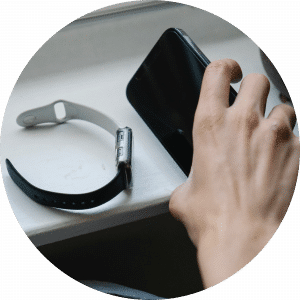You’ve tried everything from warm milk to counting sheep, you just can’t sleep when you want and want to know how? This is a problem that doesn’t affect everyone but can be head wrecking if you are part of the sleepless few. But there is most likely a few reasons why you can’t switch off.
It can feel like we have too much to do and so little time to think of everything. Most of us arrive in bed tired, wired and still have a list of things in our head we never got to complete, or a busy day tomorrow looms over us and keeps our minds racing.
We feel we’ve missed out on our “me time”! Many people reach for the phone or tablet and spend far too long scrolling. The consequence is poor sleep. It takes so long to unwind that, by the time we get to sleep, we have to be up again in 5 or 6 hours.
Sound familiar? What are the consequences of such habits on our health, wellbeing and ability to perform?
Too Busy To Rest, Too Tired To Function
The perfect storm for an inability to sleep is made up of too many demands, stress and technology all combining at the wrong time, in the wrong context. Each can be very beneficial and serve a function if they are under our control.

However, many people including athletes find that fitting everything into the day has come at the cost of cutting sleep short.
This has many consequences, but before we get into those, let’s look at what is going on.
We sort, organize, plan and problem solve using specific regions of the brain and the central computer for that is the pre-frontal cortex. This area of your brain is in charge of organisation, memory and cognitive control. Interestingly, it is also in charge of worry.
The prefrontal cortex deals with goals and predicting outcomes based on actions. With this in mind, we can see that it can cause elation or stress very easily.
With so many demands on our time, our energy coupled with tasks and responsibility, this area of the brain is highly stimulated when active. When we factor in stress, this also causing systems in our body to get prepared for taking action and usually involves the release of cortisol and adrenaline -both causing arousal and stimulating systems.
Couple this with technology and we have a recipe for an agitated, alert, overstimulated mind and body. For the athlete who may have an event, race or training session coming up and it can spell disaster for sleep.

The Cost Of Poor Sleep On Performance
There isn’t one aspect of performance that poor sleep does not impact. Shot accuracy for a football, tennis, basketball player and a host of others have been measured and assessed again and again.
The margins of error are not only very significant but shocking in some cases with tennis players losing 50% of their serve accuracy after being sleep deprived. Other aspects of learning, memory, brain health, emotional stability is also highly impacted. The effects are immediate in cases and others manifest over time.
The simple cure is more better-quality sleep. Our ability to make good decisions is impacted and this is where we often see the results of poor sleep appear first. We are just not as sharp. This is something we can accurately measure and have.
Mental fatigue caused by poor sleep has the same effect on reaction times as alcohol. It lowers them dramatically and, in every case, nobody is immune!
The big question here though is what we can do to slow the racing mind, to take back control, to reduce the anxiety and learn to fall asleep fast?
Re-Training
I don’t know how many times people have said to me “my mind just keeps racing; I can’t do anything about it”. That’s really because we have trained it to be that way. Our mind is like an untrained puppy jumping from one thought to another and unless we take steps to re-train it consistently, it will continue. You are responsible for that. Nobody else will come in and do it for you.

We must build a new routine around our bedtime habits. Awareness is the first step. Once we are aware that we are mentally or cognitively wound up, we can do something about it.
We must give the brain some chewing gum to move the activity away from the pre-frontal cortex.
This could be reading, meditation, yoga, breathing exercises or counting. It could also be something that connects you to the present moment, your feelings, sensations without jumping into your to-do list.
Knowing that people still will bring their phones into the bedroom we encourage them to use them in a positive manner. That means listening to relaxing music, sounds, a podcast or something relaxing rather than mindless scrolling on social media.
It will take time to re-train the brain so you must be patient. Find something that works for you -there is no best meditation or method. Build it into your wind-down routine and you will be able to switch off and fall asleep.
Once you start to improve, your confidence will grow, and you will become a person who can fall asleep whenever you wish.
Body composition will get better, reaction times will improve, cognitive performance and every single aspect of performance will benefit from a better, longer and deeper sleep.
Avas’ Case

The importance and requirements for teenagers are more significant as they are still developing. Sports that require the highest level of physical output and mental sharpness also demand the elite level of recovery and sleep.
Ava started by modifying her time on social media and setting times and boundaries on her bedtime. She slowly moved her bedtime by about 1 hour per week until her body and brain had adjusted.
She completely transformed her bedroom environment with the help of the Des Kelly Team and so had a very relaxing space for sleep and rest. Every aspect of her sleep improved once she got her new mattress and made some small changes.
Ava Henry Selected The Natural Sleep Company – Natures Touch Mattress

